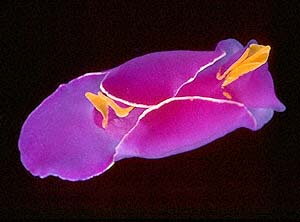
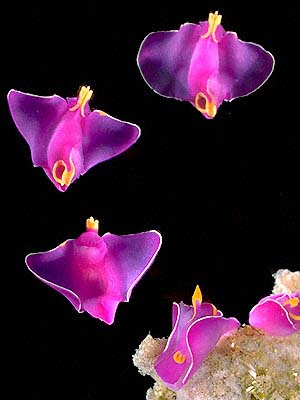
Sagaminopteron ornatum
Tokioka & Baba, 1964
Order: CEPHALASPIDEA
Family: Gastropteridae
DISTRIBUTION
It is recorded from southern Japan and much of Australia.
PHOTO
Coffs Harbour region, northern New South Wales, December 1990.
Photo: Bill Rudman.
This is the spectacular Sagaminopteron ornatum, sometimes known as the "Batwing Slug" because of its greatly enlarged wing-like parapodia. It was first found in Sagami Bay, Japan which gives rise to its name Sagaminopteron. The Gastropteridae are specialised Bubble Shells related to Philine and Chelidonura. Unfortunately we know little about their biology. To my knowledge no one has identified the food of any species. Some tropical species are usually found on particular sponges but the radular morphology suggests they are carnivores eating small active invertebrates rather than rasping sponge feeders. I have found nothing recognisable in stomach contents. I suspect that they feed on small flatworms which leave no recognisable stomach contents, but that is only a guess. I would be glad to hear from anyone who has any feeding observations on any gastropterid.
One of the most fascinating features of the gastropterids is their swimming behaviour. The genus name Gastropteron can be loosely translated as "winged stomach", which is quite apt. Like most opisthobranchs, they are normally benthic crawlers, but when disturbed they can vigorously flap their greatly enlarged parapodia and remain suspended in the water column for some minutes. In the composite picture alongside, the various stages in the swimming "stroke" are illustrated.
See Siphopteron sp. 4 which may be a colour form.
Reference:
• Tokioka, T. & Baba, K. (1964) Four new species and a new genus of the family Gastropteridae from Japan (Gastropoda: Opisthobranchia). Publications of the Seto Marine Biological Laboratory, 12(3): 201-229.
Rudman, W.B., 1998 (June 18) Sagaminopteron ornatum Tokioka & Baba, 1964. [In] Sea Slug Forum. Australian Museum, Sydney. Available from http://www.seaslugforum.net/find/sagornat
Related messages
Re: Feeding of Sagaminopteron ornatum
April 24, 2007
From: Ayumi Murakami
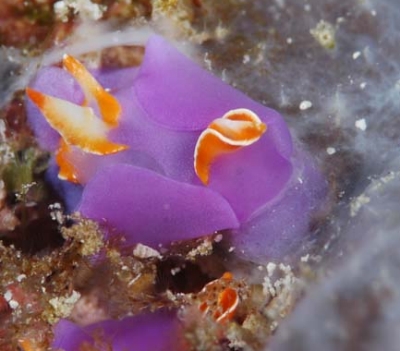
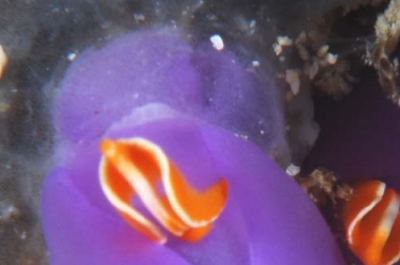
Concerning message #11470:
Dear Bill
I would like to report on a facinating sight in regards to Sagaminopteron ornatum.
Locality: Zamami Island, 15m, Kerama Is, Okinawa, Japan, Pacific Ocean, 7th April 2007, coral reef. Length: 8mm. Photographer: Mitsuo & Ayumi Murakami.
They attached themselves underneath the dead coral to feed. The most interesting thing is that there seems to be an extended mouth in purple sponge in the close up picture. Perhaps they are feeding?
I hope these pictures are useful for your research.
Sincerely
Ayumi Murakami
umiushi2@masea.info
Ayumi M, 2007 (Apr 24) Re: Feeding of Sagaminopteron ornatum. [Message in] Sea Slug Forum. Australian Museum, Sydney. Available from http://www.seaslugforum.net/find/19836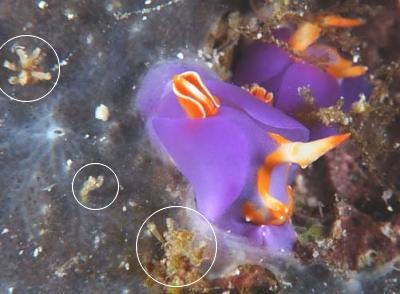
Dear Ayumi,
Thanks for these interesting photos. Your reference to Jason Bell's message [#11470] is interesting because he suggested they might be feeding on the tube fan worms in his photos. Certainly your middle photo seems to show the mouth region expanded over the sponge but I can't see any damage to the sponge. Interestingly, in the other two photos the animals seem to be lifting the edge of the sponge colony up as though they are interested in something other than the sponge.
Which brings me back to Jason's tube worms. If you look carefully at your photos, there are qite a few clusters, and single worm tubes present, some growing in the middle of the sponge colony. I have put a ring around some on the lower photo. I can't be certain, but I think polychaete worms may prove to be their preferred food.
I know it is difficult doing delicate things underwater, but a useful thing to do when you find something apparently feeding like this, is to gently lift it off 'its food' and see what it is actually doing. In this case you may have found its mouth was holding on to a worm tube, or if it is a sponge feeder, you would have seen a damaged part of the colony.
Thanks for this intersting observation. Hopefully it will encourage others to join the hunt for the food of the gastropterids.
Best wishes,
Bill Rudman
Sagaminopteron ornatum from Port Phillip Heads
May 19, 2006
From: Marc Saunders

Hi Bill,
Would you mind helping me out with the identity of this guy, which I think is a Chromodorid of some kind. No doubt it is common, but I can't find it in my field guides.
Locality: The Maze, Port Phillip Bay, 10, Victoria, Australia, Bass Strait, 25 APR 2006. Length: 25mm. Photographer: Marc SAUNDERS.
Thanks
Marc.
marc@irm.net.au
Saunders, M., 2006 (May 19) Sagaminopteron ornatum from Port Phillip Heads. [Message in] Sea Slug Forum. Australian Museum, Sydney. Available from http://www.seaslugforum.net/find/16609Dear Marc,
Although colourful this is not a chromodorid. In fact it is not a nudibranch, but belongs to a more 'primitive' group of sea slugs, the Cephalaspidea [Bubble shells, Bullomorpha], in which many representatives still have some trace of a shell. Your animal is Sagaminopteron ornatum . It is a bit different in colour from animals I am more familiar with from eastern Australia, but this appears to be the colour pattern found in southern Australia. Have a look at the Fact Sheet and other messages from Australia and Japan.
Best wishes,
Bill Rudman
Sagaminopteron ornatum from sthn Queensland
January 30, 2004
From: Gary Cobb
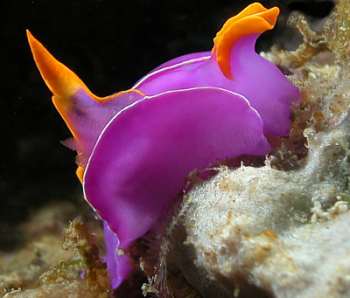

Hi Bill!
I was branching at Old Woman Island, [Sunshine Coast, sthn Queensland, Australia] on Saturday [January 2004] and a nice photo of Sagaminopteron ornatum. I never thought their gills were exposed while travelling.
Depth: 9m
Temp: 25C
Cheers
Gary Cobb
gary@cobb.com.au
Cobb, G., 2004 (Jan 30) Sagaminopteron ornatum from sthn Queensland. [Message in] Sea Slug Forum. Australian Museum, Sydney. Available from http://www.seaslugforum.net/find/12020Thanks Gary,
Nice photo showing the gills. The gills expand and contract somewhat and also can be hidden in the parapodial fold. The animal is often sensitive to stimuli - shadows, flashes etc so often the gills are withdrawn when people are around.
If you have any other photos see if you can see anything intersting at the 'mouth end' of its body. I have a feeling I can see some little tube worms in your photo but they are out of focus. Obviously a photo won't prove their eating them but it might be a useful indication of where to look
Best wishes
Bill Rudman
Sagaminopteron ornatum from Japan
November 24, 2003
From: Jason Bell
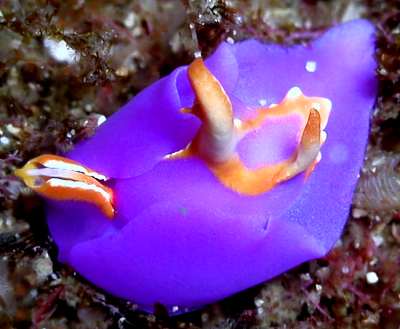
Bill,
I found these 2 Sagaminopteron ornatum on Nov 16, 2003 on Hatsushima Island, Izu, Japan. In total, I have 11 pics of the slugs and first couple of pics are of the adult (15mm). The later photos are of the smaller one - a juvenile - but you can see part of the adult in the upper right hand corner for size comparsion. On the second dive, the adult had gone undercover of some vegetation. The photos of the adult were taken on the first dive at about 10am. The last 4 photos [in a separate message] were taken on the 2nd dive at about 12:30pm
I hope this helps.
Jason Bell
belljason@hotmail.com

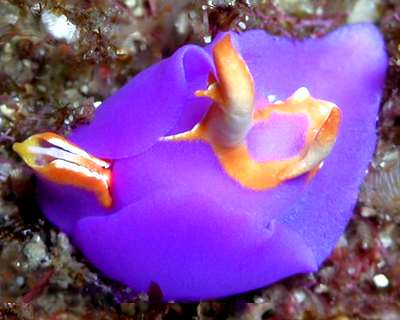
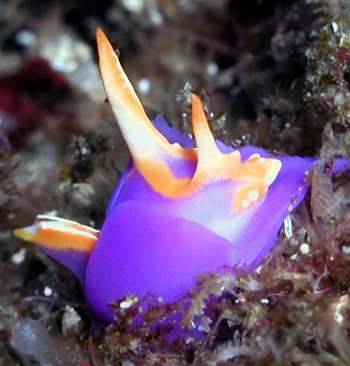
Thanks Jason,
These photos of the adult help confirm the colour pattern of Japanese specimens. They also give us a good idea of the external shape
Best wishes
Bill Rudman
Sagaminopteron ornatum - showing feeding?
November 24, 2003
From: Jason Bell
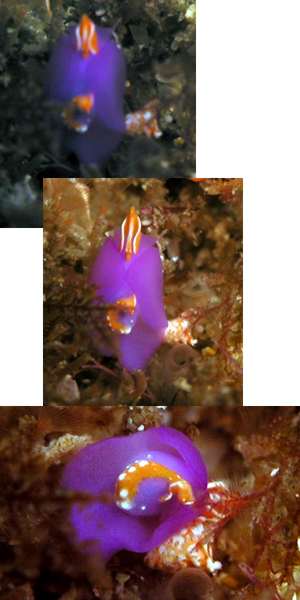
Bill,
To accompany my photos of an adult Sagaminopteron ornatum on Nov 16, 2003 on Hatsushima Island, Izu, Japan, here are some photos of a juvenile, which was less than a third the size of the adult. On my second dive, the adult had gone undercover in some vegetation. I believe it shows the juvenile feeding on some worms (?). I did not see the possible food source until I uploaded the pics.
I hope this helps.
Jason Bell
belljason@hotmail.com
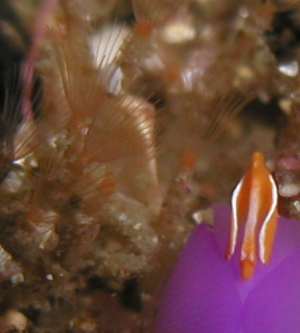
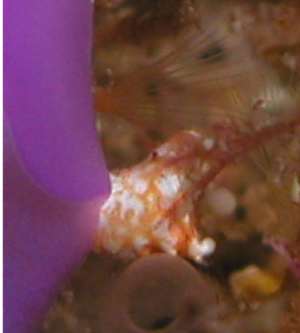
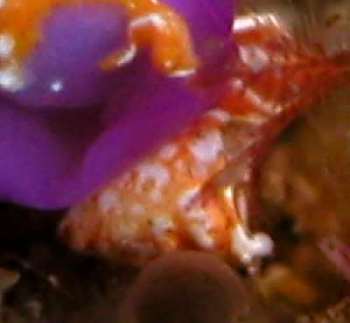
Dear Jason,
Thanks for these tantalising photos. The small animal does seem to be crawling on an area with many small polychaete tube worms, many with their fan-like feeding tentacles displayed. However from your sequence of shots, it seems the slug has taken a sudden interst in the orange and white object on its right side. Ot perhaps it just decided to turn around at that moment. I'm afraid I can't identify what the orange and white object is either.
As I said, it is a tantalising observation, but .... Hopefully we will someday find out what Sagaminopteron, or for that matter, any gastropterid, feeds on
Best wishes
Bill Rudman
Sagaminopteron ornatum from SE Queensland
September 3, 2003
From: Gary Cobb
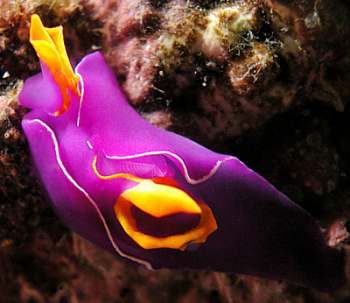
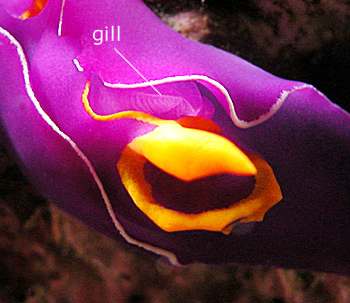
Hi Bill,
Please find attached a photo of Sagaminopteron ornatum I took 23 August 2003 at Old Woman Island of Mooloolaba [SE Queensland, Australia]. Depth was 8m. 10mm length
This shot I believe shows the animal's gills, am I right?
Thanks for your help
Gary Cobb
gary@cobb.com.au
Cobb, G., 2003 (Sep 3) Sagaminopteron ornatum from SE Queensland. [Message in] Sea Slug Forum. Australian Museum, Sydney. Available from http://www.seaslugforum.net/find/10833Thanks Gary,
Yes your photo does show a gill. I guess there may be more below that one. Most cephalaspideans, including most gastropterids, have a single gill, but Sagaminopteron ornatum, and others in that genus can have 4 or 5 gills, arranged on the right side of the body, one above the other.
Best wishes
Bill Rudman
Sagaminopteron ornatum from South Australia
April 28, 2003
From: Alex Suslin
Greetings!
Accessed your site to get more info on Sagaminopteron ornatum, having seen one whilst scuba diving at Port Noarlunga Reef, some 30 kms south of Adelaide, South Australia. They used to be common there several years ago, until off-shore dredging badly silted up the reef. This was the first one I've seen since then, so hopefully, it may be a harbinger of the reef's recovery.
I note that under "Distribution", you include "...east & west coasts of tropical & subtropical Australia." It is also found along the temperate south coast, where water temperatures vary seasonally from about 10 - 20 degrees centigrade.
Confirmation of this critter's temperate water distribution can be found in
• Shepherd, S.A. & Thomas, I.M. (1989) Marine Invertebrates of Southern Australia Part II (South Australian Government Printing Division).
Alex Suslin
alexs@adam.com.au
Thanks Alex,
You are of course correct. I certainly know of records from South Australia but am not sure of any finds in Victoria and Tasmania. If anyone has reords from there I would be most interested.
Best wishes,
Bill Rudman
Sagaminopteron ornatum from Lord Howe Island
January 22, 2003
From: W.B. Rudman
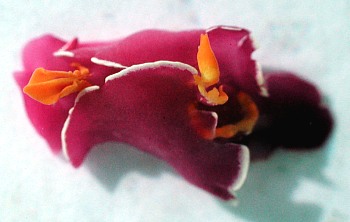
Here is a photo record from Ian Hutton of Sagaminopteron ornatum from Lord Howe Island.
Location: Middle Beach.
Bill Rudman
Rudman, W.B., 2003 (Jan 22) Sagaminopteron ornatum from Lord Howe Island. [Message in] Sea Slug Forum. Australian Museum, Sydney. Available from http://www.seaslugforum.net/find/8985Egg mass of Sagaminopteron ornatum
July 29, 2002
From: Nishina Masayoshi

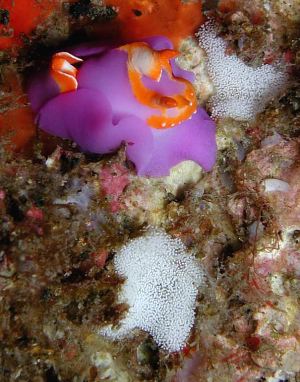
Dear Bill,
Here is a photo of Sagaminopteron ornatum
Date: 7 July,2002
Loc: Hachijo Is, Tokyo Japan
Length of S.ornatum: 10mm
Depth: 13m
water temp: 25C degree
Best Regards,
Nishina Masayoshi
nishina@wips.co.jp
Masayoshi, N., 2002 (Jul 29) Egg mass of Sagaminopteron ornatum. [Message in] Sea Slug Forum. Australian Museum, Sydney. Available from http://www.seaslugforum.net/find/7586Thanks Nishina,
Another very useful bit of information,
Best wishes,
Bill Rudman
Sagaminopteron from New South Wales
July 13, 1999
From: Grey McNeil
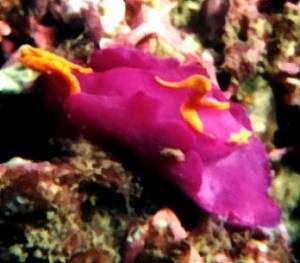
Hi Bill,
Is this a species of Sagaminopteron?
I found it at Snowflake Reef, Forster, New South Wales, Australia in April 1996 at 15m.
They appeared to be in groups of 4-6 maybe mating?
Thanks,
Grey.
GREYMACIND@bigpond.com.au
McNeil, G., 1999 (Jul 13) Sagaminopteron from New South Wales. [Message in] Sea Slug Forum. Australian Museum, Sydney. Available from http://www.seaslugforum.net/find/1015Dear Grey,
Yes this is Sagaminopteron ornatum one of the most spectacular of the gastropterids. Many of them swim when disturbed. Have a look at the composite picture of them swimming.
Bill Rudman.
A swimming sea slug
June 18, 1998
From: Wayne Ellis
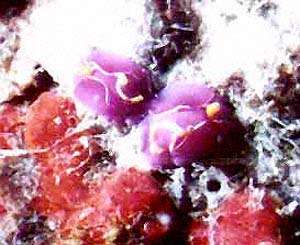
Hi Bill,
Here is another of Steve Grail's photos. It was taken off Mooloolaba, Sunshine Coast, southern Queensland, in 10-20m, between 1996 and 1998.
Regards
Wayne Ellis
glaskin@ozemail.com.au
Ellis, W., 1998 (Jun 18) A swimming sea slug. [Message in] Sea Slug Forum. Australian Museum, Sydney. Available from http://www.seaslugforum.net/find/124
This is the spectacular Sagaminopteron ornatum, sometimes known as the "Batwing Slug" because of its greatly enlarged wing-like parapodia. It was first found in Sagami Bay, Japan which gives rise to its name Sagaminopteron. The Gastropteridae are specialised Bubble Shells related to Philine and Chelidonura. Unfortunately we know little about their biology. To my knowledge no one has identified the food of any species. Some tropical species are usually found on particular sponges but the radular morphology suggests they are carnivores eating small active invertebrates rather than rasping sponge feeders. I have found nothing recognisable in stomach contents. I suspect that they feed on small flatworms which leave no recognisable stomach contents, but that is only a guess. I would be glad to hear from anyone who has any feeding observations on any gastropterid.
One of the most fascinating features of the gastropterids is their swimming behaviour. The genus name Gastropteron can be loosely translated as "winged stomach", which is quite apt. Like most opisthobranchs, they are normally benthic crawlers, but when disturbed they can vigorously flap their greatly enlarged parapodia and remain suspended in the water column for some minutes. In the composite picture alongside, the various stages in the swimming "stroke" are illustrated. .... Bill Rudman.
Rudman, W.B., 1998 (Jun 18). Comment on A swimming sea slug by Wayne Ellis. [Message in] Sea Slug Forum. Australian Museum, Sydney. Available from http://www.seaslugforum.net/find/124